Last year at Basel World, Sinn announced a handful of curious and unexpected watches, from the diving-pilot’s EZM 3F to the cleverly vintage 903 ST B E. But perhaps the most surprising was the 240 ST. Utilizing a case that dates back to at least the 80’s, this barrel shaped tool-pilot is both new and a throwback. For those familiar with Sinn’s line and history, you’ll immediately note that the case comes from the revered 140/142 chronographs. Originally powered by the Lemania 5100, these rugged chronos are collector’s pieces not just for their style, but also for their historical significance. As discussed in this article here, the 140/142s were, for a time, considered to be the first automatic chronographs worn in space. Sinn has since reissued those watches with their in-house modified Valjoux 7750 movement, the SZ01 and packed them full of their in-house tech. As expected, they command a demand a price of over $4k.
The 240 ST is the first time this distinct barrel case has been used on a 3-hand watch, which already creates an interesting proposition. Add onto that that it’s one of Sinn’s more entry level pieces, coming in as low as $1,560 on leather, and it gets even more intriguing. Along with the 556‘s and 104’s, the 240 ST is part of their growing no-tech 3-hand tool watches, which offer a more affordable way to get a Sinn. What sets the 240 apart though is its distinct style, internal bezel and comfortable-to-wear larger size. This German-made watch also features a sapphire with AR and is powered by a Sellita SW 220-1.
Sinn 240 ST Review
 Case: Stainless Steel
Case: Stainless Steel
Movement: SW 220-1
Dial: Black
Lume: Yes
Lens: Flat Sapphire Crystal w/ AR
Strap: Leather or Steel Bracelet
Water Resistance: 100m
Dimensions: 43mm X 46mm
Thickness: 11 mm
Lug Width: 22 mm
Crown: 2x 6mm crowns
Warranty: 2 Years
Price: $1,560 on leather $1,730 on steel
Case
The barrel shaped case of the 240 ST has a very 20th century feel, but somehow doesn’t look dated. Though a barrel, it’s a very unique shape with gorgeous curves and interesting proportions, making it both distinctly Sinn and surprisingly attractive. Measuring 43 x 46 x 11mm, it’s wide and flat, with almost square dimensions. The fact that the lug-to-lug is so short makes it very wearable on a variety of wrists, while the surprisingly thin profile just adds to the comfort and sleekness.
The design is deceptively complex. From the top, it just looks like a fat barrel with a few lines, but when you look at it from an angle, you can see how complicated the curves are. There isn’t a flat surface anywhere, and the whole case bows to accommodate the wrist. Notably, you have these classic and true barrel shaped lines connecting the lugs on one side to the other. These are flanked by large swooping bevels which connected the outside of the lugs. This area is a cut away, removing mass from the case. They are probably my favorite detail on the watch as whole, reminding almost of the kind of flat detailing you find on Grand Seikos. The whole case is also evenly bead blasted for a low-gloss finish with a gorgeous sheen.
At 2 and 4 you have the internal bezel and time crowns, respectively. As a fan of dual-crown and “super-compressor” watches, I quite like this arrangement. I was glad to see they went with this design rather than 10 and 3, which would more closely match the 140/2’s. At 2 and 4 there is a nice balance and it plays off of that sort of throw back feel. The crowns are identical, measuring 6mm in diameter with deep grooves fro texture and a domed end with a Sinn “S” logo. They look good, are easy to grasp and are sized well for the watch.
I was surprised however to find that neither screwed down. The watch is geared towards being a pilot, so it boasts only a 100m WR, which in Sinn’s catalog means it’s not for diving but can get wet. But the real issue is that the internal bezel has a tendency to shift a little bit when at rest because the crown is fairly easy to turn. The bezel has a non-ratcheting, bi-directional design, so it just easily glides around. Had it been either ratcheting or had a screw-down crown to lock the bezel in place, it would alleviated this issue.
Flipping the watch over, the case back is fairly unadorned. It’s just a slab of steel with a few details listed in German. I don’t mind that it’s solid, but considering it’s not a diver and that the less expensive 556’s have sapphire backs, showing off those sexy gold-tone Sinn rotors, I think it would have been welcome here too.
Dial
The dial of the 240 has a classic 70’s-80’s German military feeling that has been a part of Sinn’s repertoire for some time. It’s feels right at home on the 240, and as someone who personally loves that era, I’m quite fond of the stripped down and slightly dated look. In context, it’s basically the 140 dial without the chronograph functions. So, the dial consists of a primary index of pale green lumed rectangles on a matte black surface. Between each marker are individual minute/seconds lines and 1/4th second lines all in white. The sub-seconds create a border around the inner dial before the internal bezel that closes the area off nicely.
On the inside of the lumed markers is an index of numerals for the minutes/seconds as well. The numerals are small and white as well. I have two issues with this index. I like that it exists as it stays true to the design, but the numbers feel too close to the markers, especially since there is plenty of space towards the center of the dial. This is particularly noticeable around the 25 and 35 numerals.
The other issue is redundancy. Have a 0-60 index on the internal bezel as well as here feels like one too many. Perhaps this index could have been a 13-24 index. Or preferably, this one remained as is, and the internal bezel index became a countdown or 12-hr bezel. If the latter had been the case, not only would it have supplied the missing hour numerals, but by rotating it, one could have tracked a second timezone, which is a feature I personally enjoy.
Looking at the internal bezel index, it features larger numerals in a very legible typeface, all in white. The origin marker is then a lumed triangle. The execution of the index is great and the design is attractive. As just said though, I wish it would add more function. Yes, it’s the same bezel that is on the 140, but being that that watch has a central minute counter chronograph, having a rotating minute index could come in handy.
Other than the indexes, the dial surface is pretty empty. No block of text at 6, which was a welcome. At 3 there is a day/date window gratis of the SW 220-1 movement. The window has a thin white out line to make it stand out, while the date disks are white on black, staying pretty low-key. The execution here is fine, though I do think it’s a touch crowded. More than on other watches, the date seems to be in shadow.
The 240 features the same great handset that you’ll find on the 140…as well as the EZM 13, EZM 3, EZM 1, 157, 156 and various other watches Sinn has made over the years. I simply love this hand set. The hour and minute are simple straight swords with pointed tips present in lume with no surrounds that turns matte black by the central axis. They are just the right size to be legible and aggressive, but much smaller than the roman sword aviator hands one also finds on Sinns. The best detail is that the minute hand comes to an elongated tip, pointing to the very edge of the dial. I don’t know why, I just love the way that looks. The seconds hand is then a tapering stick in day-glow orange with a matte black counter-weight. This sudden shock, and I do mean shock, of color is a nice addition to the overall palette.
As with the EZM 13, the 240 ST has great lume. The pale green lume they use is far superior to the white lume found on the 556i, for example.
Straps and Wearability
The 240 ST has two straps options: a 22mm Di-Modell leather for $1,560 and a steel bracelet for $1,730. Starting with the latter, the bracelet has an interesting design that takes the barrel shaped case into account. It’s a h-link bracelet in matching matte steel, which is very attractive, and has a dramatically tapering design. The end links have small cutaways, so it expands from 22mm to 26mm. This makes the case flow in to the bracelet better. The bracelet then tapers from 26 to 18mm, which is a large difference. By doing this, it becomes much more comfortable to wear and elegant to look at.
I do have a couple of issues with the bracelet though, starting with the end links. They don’t meet the case in an elegant way, with an awkward gap between the two, almost like it was an after market design. Then, because they catch against the case, they don’t flex down, extending the lug-to-lug length by a lot. Oddly enough, Sinn made a form fitting end-link for an older version of the 142 you can view in their archives. While a bit odd looking, they do complete the case design better than what is offered here. The last issue is just that their clasp is a little underwhelming. It’s a very standard design that could use some updating. Nothing wrong with it either, so I suppose “if it ain’t broke don’t fix it” could apply, but I just was hoping for something more substantial.
So, my preferred, and luckily the less expensive, choice is the leather. This is one of Sinn’s modified Di-Modell Chronissimo Straps. We’re such big fans of these straps, we stock them in our shop, so I was happy to see it in use here. The 240 is also the kind of watch that strap was made for. Like the bracelet, it flairs out at the lugs to create more flow from the case, as well as tapers towards the buckle. Unlike the bracelet, however, the strap will flex down to better form to the wrist. This makes the watch wear much better in my opinion, as the 46mm lug-to-lug makes the big watch wear small with the right strap. Apart from fit, the black leather then really brings out the dial and accentuates the case geometry.
On the wrist, the 240 ST is one of the best wearing 43mm I’ve ever tried. It’s wide, but short, so you get this nice big dial, but not a huge feeling or looking watch. It’s also pleasantly thin at 11mm, making it wear close and comfortable. On my 7″ wrist, it really fit ideally and I think it would work on wrists both larger and smaller. That said, the bracelet does add to the length as mentioned above, so I wouldn’t recommend it for smaller wrists.
Aesthetically, it’s a great looking watch. If I didn’t know better, and someone handed this watch to me and said “check out my vintage Sinn”, I’d believe them. This watch looks like it’s from the 70’s or 80’s, but in a way that is awesome. Sinn stuck to the vocabulary they’ve used for 30 years and it works as well today as it did back then. Mix this sort of unintentional vintage style with the gorgeous case, clear dial design and mild pallette, and you have a great and versatile watch. I found that it’s natural mil/tool looks worked really well with the sort of rugged, classic clothing I typically wear, so it was an easy watch to integrate.
Conclusion
The Sinn 240 ST is a welcome addition to the Sinn line-up. It was smart of them to get more mileage out of this excellent case design. And is true Sinn style, they didn’t mess it up by creating some over the top dial. Rather, they did the opposite and created something true to their roots, which ends up extremely attractive. While I did have some issues here and there, I think the watch comes together overall to be a very enjoyable and comfortable watch to wear.
With that said, I think the pricing and feature set puts the 240 in sort of s no-man’s land in Sinn’s line up. Starting at $1,560, it’s a few hundred dollars more than the much beloved 556i/a, but other than an internal bezel, doesn’t offer more value or tech, just a different style. And honestly, I wish it did have a tegimented case. That’s such a great feature to have, and being that the 140’s have it, just seems like a natural addition here. Then maybe the 240’s would have cost a bit more, slightly above the 856’s at around $1800-$2k, but by offering both a new case shape and some tech would have been a nice compliment to those more classically styled pilot’s watches.
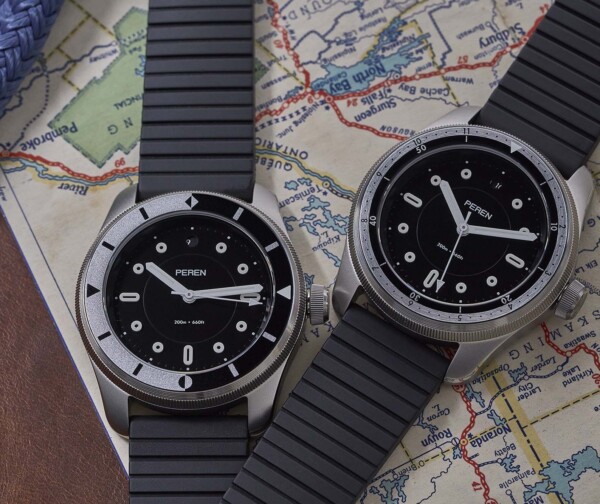




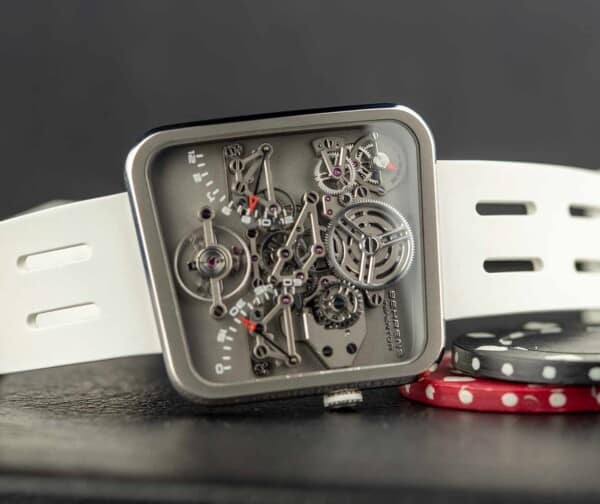
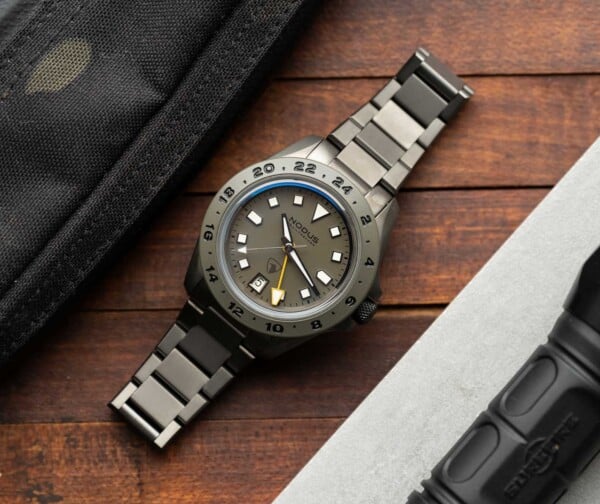


 Featured Videos
Featured Videos




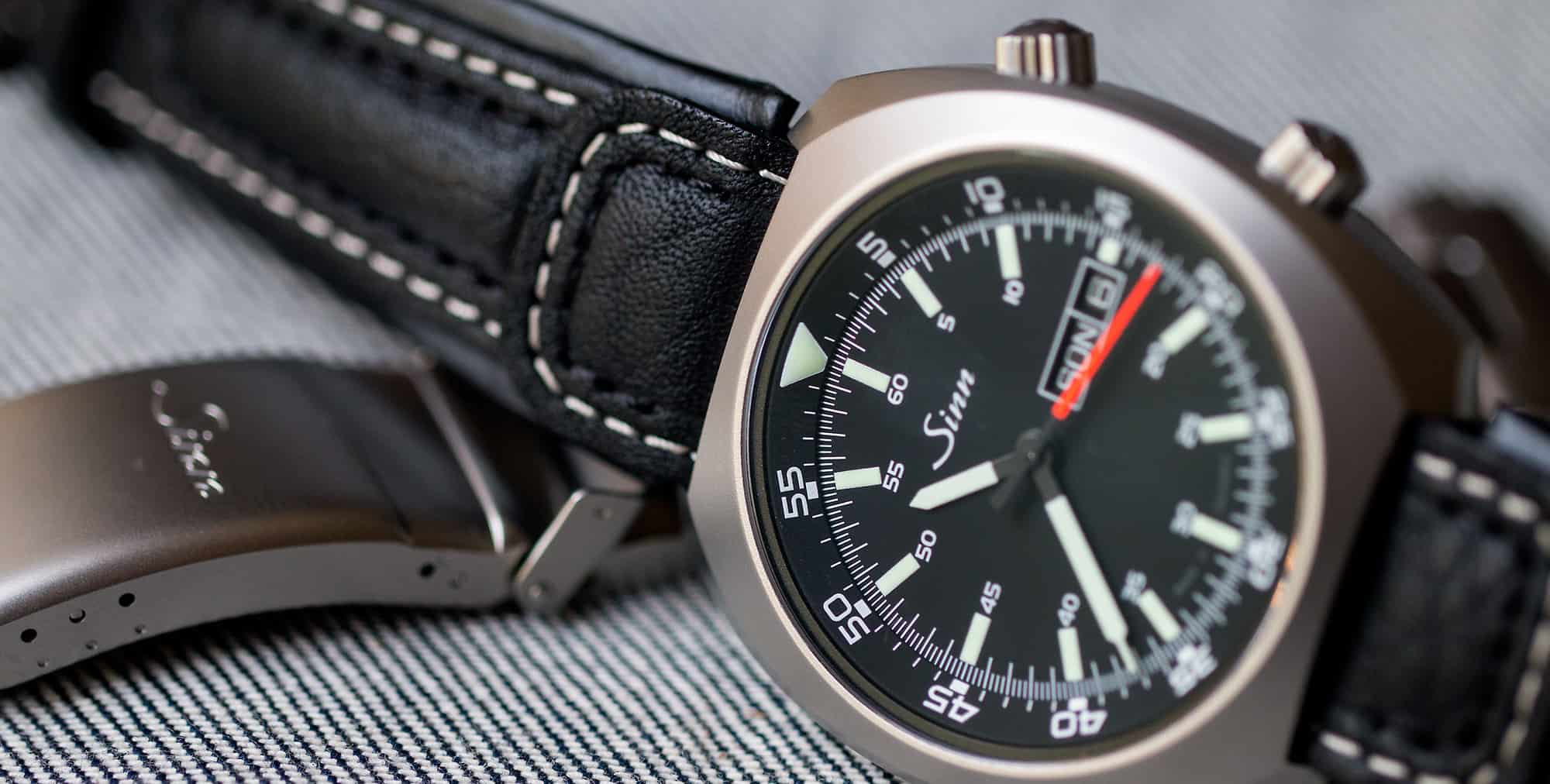











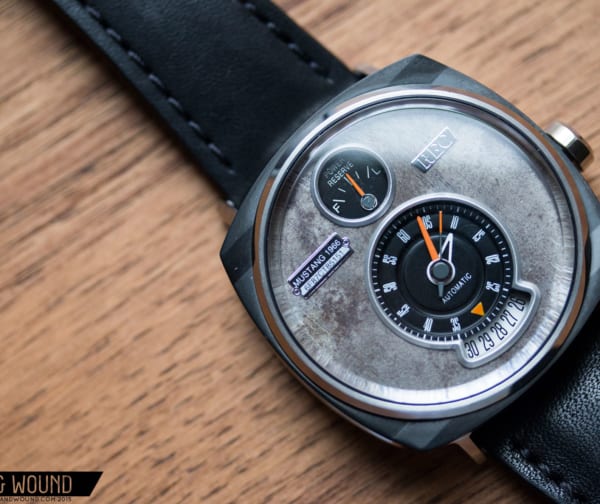
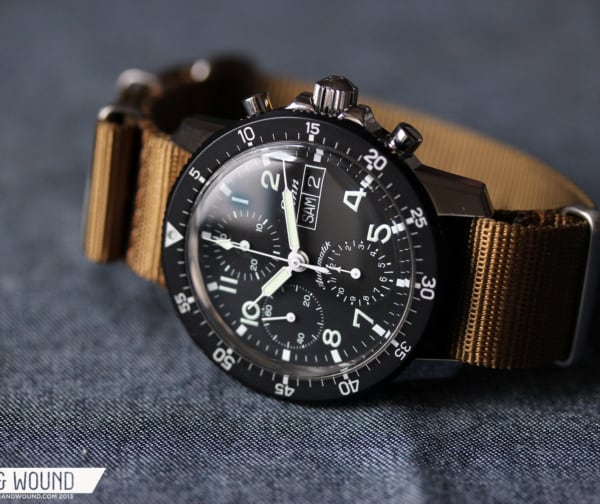

I have the same beef with Sinn endlinks. I have a 203 Ti AR, from the folded endlink era. They were annoyingly clinky and the folded edges didn’t match the crispness of the 203 case. When i had a service, I sprung for the solid titanium endlinks. The ‘clink’ is gone, but again, i was disappointed to find that the endlinks did not have the same crispness as the case. it’s a big miss for Sinn, and i don’t know why they can’t get this right. The 203 lives on a NATO now, and I will probably man-up and get the W&W crimson strap at the end of the year.
Thank you, Zach, for both his written review and your even-more enlightening Youtube version. I’ve been considering this watch for the better part of a year, torn between its great throw-back design, internal bezel and day/date complication and the utter simplicity of the time-only, Unitas-powered and similarly-priced Guinand 31. As a professional pilot, I can appreciate both ends of this spectrum; hence, my dilemma.
And speaking as an aviator, I might lend some insight about that bezel. You complained– and, in my opinion, rightly so– that it might have been better used for a second time zone. (Matter of fact, the search for a two-zone/GMT watch is what started me on the whole mechanical watch journey years ago.) Perhaps you’re now aware that Sinn produced such a version, limited to a run of 100, for a popular German watch magazine a couple of years ago. I’ve seen two pop up second-hand since then, but priced over $2000; really too much, if you ask me. And the use of black-on-white both on the rotating bezel and day/date window spoils the aesthetics, in my opinion (like you, I have a background in design, as well).
But getting back to that pilot’s insight: As currently offered, the Sinn 240 works perfectly well as a two-zone watch. My current flying companion is an inexpensive quartz dive watch; I learned years ago that by rotating the luminous index to account for the difference between local time and GMT, the bezel becomes a de facto second time zone. Currently, here in the midwest, my index sits at the six o’clock position; as such, it serves as a reminder of our six hours difference from GMT. But it also means that any five-minute marker on the bezel to which the hour hand points will indicate the GMT hour. As I write this, for example, I know that it’s 9:30 PM GMT because the hour hand is half-way between the bezel’s 45 minute (9 hr.) and 50 minute (10 hr.) markers.
Perhaps it sounds clumsy– granted, I jump between local and Zulu time every day– but it’s really a no-brainer. It makes the Sinn 240 all the more appealing… and any dive watch more useful on– and above– terra firma.